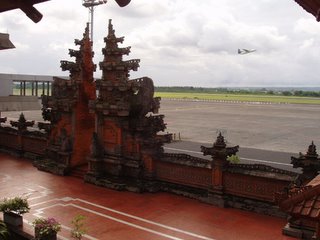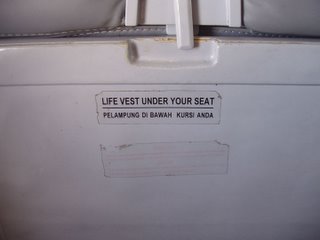2005 was arguably the year human rights took a severe beating all over the world. And there is only one guy to blame, George 'Dubya' Bush. His policies in the US and overseas completely trashed the concept of respecting human rights.
The motto of the year seemed to be: "If America, the bastion of democracy, can beat the crap out of the prisoners in Abu Ghraib and Guantanamo Bay, then why the hell can't we."
According to a report from Human Rights Watch," evidence showed that abusive interrogation cannot be reduced to the misdeeds of a few low-ranking soldiers, but was a conscious policy choice by senior U.S. government officials. The policy has hampered Washington’s ability to cajole or pressure other states into respecting international law."
Let us count the number of times the US pooh-poohed human rights:
1. the torture in Abu Ghraib
2. the abusive interrogation in Guantanamo facility
3. the so called 'CIA Flights'
4. the illegal wiretapping including electronic surveillance of its own citizens
The list goes on and on. However, the US is not alone in accumulating points in human rights abuses department. The same Human Rights Watch report went on to enumerate abuses in other parts of the globe: the ethnic cleansing in Darfur; repression in Burma, Tibet, Turkmenistan, Vietnam and Syria; and the massive, politically motivated evictions of informal settlers in Harare in Zimbabwe. However, the New York based human rights watchdog failed to include the situations in Thailand and in the Philippines.
For some time now, media practitioners in Thailand have been under severe government restriction. They are victims of harrassment, courtesy of
Thaksin 'The Sore Loser' Shinawatra. Journalists, editors and activists agreed that the trend in the Buddhist kingdom leans towards less press freedom. Just ask
Supinya Klangnarong, the poster girl for the Thai government's repression against the media. A writer and freedom of speech activist, Supinya has been sued for libel by Shin Corporation, which is owned by Thaksin's family. According to the Thai Press Council, the number of criminal defamation suits filed against journalists had more than doubled compared to the number filed in 2004.
Here in the Philippines, goons and politicians (aren't they the same?) do not file criminal charges against the media; they just shoot them in the head or bury them alive. Sometimes they accuse the media of harboring terrorists which gives them license to haul them off to jail. No lawsuits, no hassles. Just plain political thuggery. Isn't that much simpler?
Then we have calibrated pre-emptive response, GMA's own little version of Bush's pre-emptive strike. Suddenly, no more maximum tolerance for the pesky rallyists. If the authorities are not busy bashing the heads of the activists into pieces then they are 'cannonizing' them with water. Last year, the police really had a field day beating the hell out of the protesters.
In 2005, human rights was the sacrificial lamb in the altars of power-hungry despots and Dubya's war on terrorism. I hope this year will be better for human rights.
Sana.
 Mall or Airport? Well, i must say both. Changi Airport is one awesome airport. It's huge. It's gleaming. And it's packed with people from all corners of the globe. There's this group of Texans who were completely astounded by Changi's size that they were reduced to saying "Man, this is fucking big."
Mall or Airport? Well, i must say both. Changi Airport is one awesome airport. It's huge. It's gleaming. And it's packed with people from all corners of the globe. There's this group of Texans who were completely astounded by Changi's size that they were reduced to saying "Man, this is fucking big." Like Soekarno-Hatta Jakarta International Airport, the international airport in Bali is Asian-inspired in its design and architecture. The first thing you will hear upon arrival is the enchanting Balinese classical music being played throughout the whole terminal. It's like setting foot in a Hindu temple. Very relaxing.
Like Soekarno-Hatta Jakarta International Airport, the international airport in Bali is Asian-inspired in its design and architecture. The first thing you will hear upon arrival is the enchanting Balinese classical music being played throughout the whole terminal. It's like setting foot in a Hindu temple. Very relaxing.
 On board Merpati Airlines from Denpasar to Dili in East Timor. The plane was ancient and rusty. It was clearly showing its age. The tray in front of my seat was broken, I requested to be transferred to another seat. Boy, I have never been so scared in my entire life. When the flight crew started to demonstrate the safety features of the aircraft I watched and listened carefully. I checked the life vest, the oxygen mask and scolded a teenaged girl when she attempted to open her mobile phone! Barely-stifled screams ripped out of my throat when we encountered air pockets. I even made the sign of the cross twenty times during the first 30 minutes of the flight! Looking around, I noticed fear and anxiety in the faces of my co-passengers. Even the flight attendants themselves seemed to be not too happy being in that airplane. I decided to get hold of myself and ordered several glasses of wine. Fifteen minutes before the plane landed the fear was gone and I was smiling like a fool. Obviously, I was again happily stewed! Hehehe.
On board Merpati Airlines from Denpasar to Dili in East Timor. The plane was ancient and rusty. It was clearly showing its age. The tray in front of my seat was broken, I requested to be transferred to another seat. Boy, I have never been so scared in my entire life. When the flight crew started to demonstrate the safety features of the aircraft I watched and listened carefully. I checked the life vest, the oxygen mask and scolded a teenaged girl when she attempted to open her mobile phone! Barely-stifled screams ripped out of my throat when we encountered air pockets. I even made the sign of the cross twenty times during the first 30 minutes of the flight! Looking around, I noticed fear and anxiety in the faces of my co-passengers. Even the flight attendants themselves seemed to be not too happy being in that airplane. I decided to get hold of myself and ordered several glasses of wine. Fifteen minutes before the plane landed the fear was gone and I was smiling like a fool. Obviously, I was again happily stewed! Hehehe.





